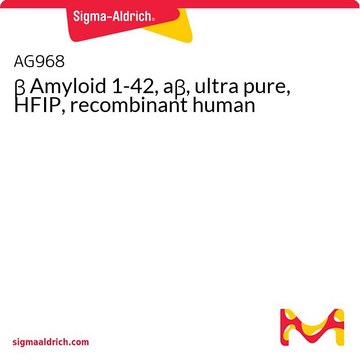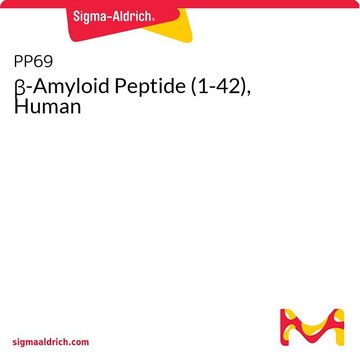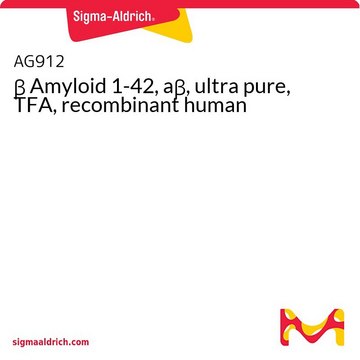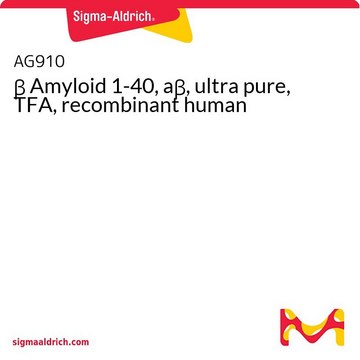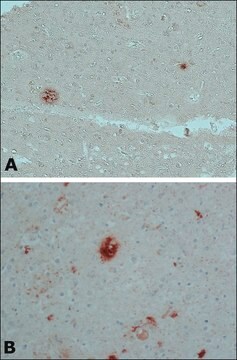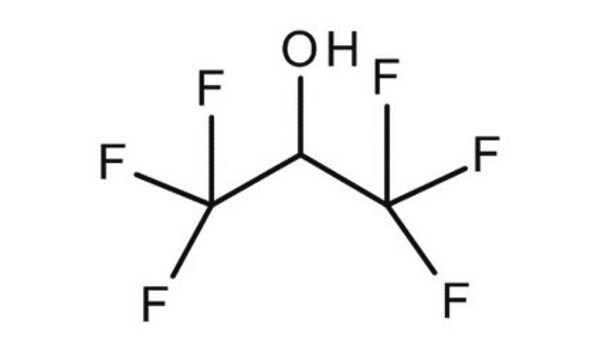AG962
β Amyloid 1-40, aβ, ultra pure, HFIP, recombinant human
Zaloguj sięWyświetlanie cen organizacyjnych i kontraktowych
About This Item
Kod UNSPSC:
12352202
eCl@ss:
32160405
NACRES:
NA.41
Polecane produkty
pochodzenie biologiczne
human
Poziom jakości
Próba
>97%
Formularz
powder
producent / nazwa handlowa
Chemicon®
numer dostępu NCBI
numer dostępu UniProt
informacje o genach
human ... APP(351)
Opis ogólny
Beta Amyloid (1-40), ultra pure, HFIP.
MOL. WT.: 4329.86 Da by Mass Spec Analysis (theoretical 4329.86)
SEQUENCE: Asp-Ala-Glu-Phe-Arg-His-Asp-Ser-Gly-Tyr-Glu-Val-His-His-Gln-Lys-Leu-Val-Phe-Phe-Ala-Glu-Asp-Val-Gly-Ser-Asn-Lys-Gly-Ala-Ile-Ile-Gly-Leu-Met-Val-Gly-Gly-Val-Val
PEPTIDE CONTENT: 1 mg per vial; no salt as HFIP desalts the sample.
COUNTER ION: HFIP
MOL. WT.: 4329.86 Da by Mass Spec Analysis (theoretical 4329.86)
SEQUENCE: Asp-Ala-Glu-Phe-Arg-His-Asp-Ser-Gly-Tyr-Glu-Val-His-His-Gln-Lys-Leu-Val-Phe-Phe-Ala-Glu-Asp-Val-Gly-Ser-Asn-Lys-Gly-Ala-Ile-Ile-Gly-Leu-Met-Val-Gly-Gly-Val-Val
PEPTIDE CONTENT: 1 mg per vial; no salt as HFIP desalts the sample.
COUNTER ION: HFIP
Zastosowanie
Different researchers claim enhanced activity due to different salts.
The TFA salt is what has been the industry standard.
The HFIP makes the beta-amyloid homogenously monomeric.
The NaOH apparently make it monomeric too and is also water soluble, which the TFA salt and HFIP are not.
The HCl salt is supposed to be more biological, as TFA is not found in the body.
By offering the different salts, it lets the researchers duplicate the different assays that have been developed by other researchers (see below).
TFA: Shu-chuan Jao, S-C, et. al. 1997, Amyloid; Int J Exp. Clinical Invest. 4, 231
HFIP: Stine, W.B. et. al. 2003, J. Biol. Chem, 278, 11612
NaOH: Fezoui, Y., et. al. 2000, Amyloid, 7, 166
HCL: Kanek, I and Tutumi, S., 1997, J. Neurochem, 68, 438
The TFA salt is what has been the industry standard.
The HFIP makes the beta-amyloid homogenously monomeric.
The NaOH apparently make it monomeric too and is also water soluble, which the TFA salt and HFIP are not.
The HCl salt is supposed to be more biological, as TFA is not found in the body.
By offering the different salts, it lets the researchers duplicate the different assays that have been developed by other researchers (see below).
TFA: Shu-chuan Jao, S-C, et. al. 1997, Amyloid; Int J Exp. Clinical Invest. 4, 231
HFIP: Stine, W.B. et. al. 2003, J. Biol. Chem, 278, 11612
NaOH: Fezoui, Y., et. al. 2000, Amyloid, 7, 166
HCL: Kanek, I and Tutumi, S., 1997, J. Neurochem, 68, 438
Research Category
Neuroscience
Neuroscience
Research Sub Category
Neurodegenerative Diseases
Neurodegenerative Diseases
Postać fizyczna
White lyophilized powder. Resuspend in 1% NH4OH at a concentration of 1 mg/mL. Sonicate for 30 seconds to 1 minute after it has gone into solution. To bring into your solution: After resuspension, add 5x or 10x buffer stock (PBS, TBS) and water to bring to 1x buffer.
Przechowywanie i stabilność
Maintain lyophilized material at -20ºC for up to 12 months after date of receipt. After reconstitution maintain at -20ºC to -70ºC for up to 2 weeks in undiluted aliquots. Avoid freeze/thaw cycles to avoid aggregation.
Informacje prawne
CHEMICON is a registered trademark of Merck KGaA, Darmstadt, Germany
Oświadczenie o zrzeczeniu się odpowiedzialności
Unless otherwise stated in our catalog or other company documentation accompanying the product(s), our products are intended for research use only and are not to be used for any other purpose, which includes but is not limited to, unauthorized commercial uses, in vitro diagnostic uses, ex vivo or in vivo therapeutic uses or any type of consumption or application to humans or animals.
Ta strona może zawierać tekst przetłumaczony maszynowo.
Kod klasy składowania
11 - Combustible Solids
Klasa zagrożenia wodnego (WGK)
WGK 1
Temperatura zapłonu (°F)
Not applicable
Temperatura zapłonu (°C)
Not applicable
Certyfikaty analizy (CoA)
Poszukaj Certyfikaty analizy (CoA), wpisując numer partii/serii produktów. Numery serii i partii można znaleźć na etykiecie produktu po słowach „seria” lub „partia”.
Masz już ten produkt?
Dokumenty związane z niedawno zakupionymi produktami zostały zamieszczone w Bibliotece dokumentów.
Klienci oglądali również te produkty
Nasz zespół naukowców ma doświadczenie we wszystkich obszarach badań, w tym w naukach przyrodniczych, materiałoznawstwie, syntezie chemicznej, chromatografii, analityce i wielu innych dziedzinach.
Skontaktuj się z zespołem ds. pomocy technicznej